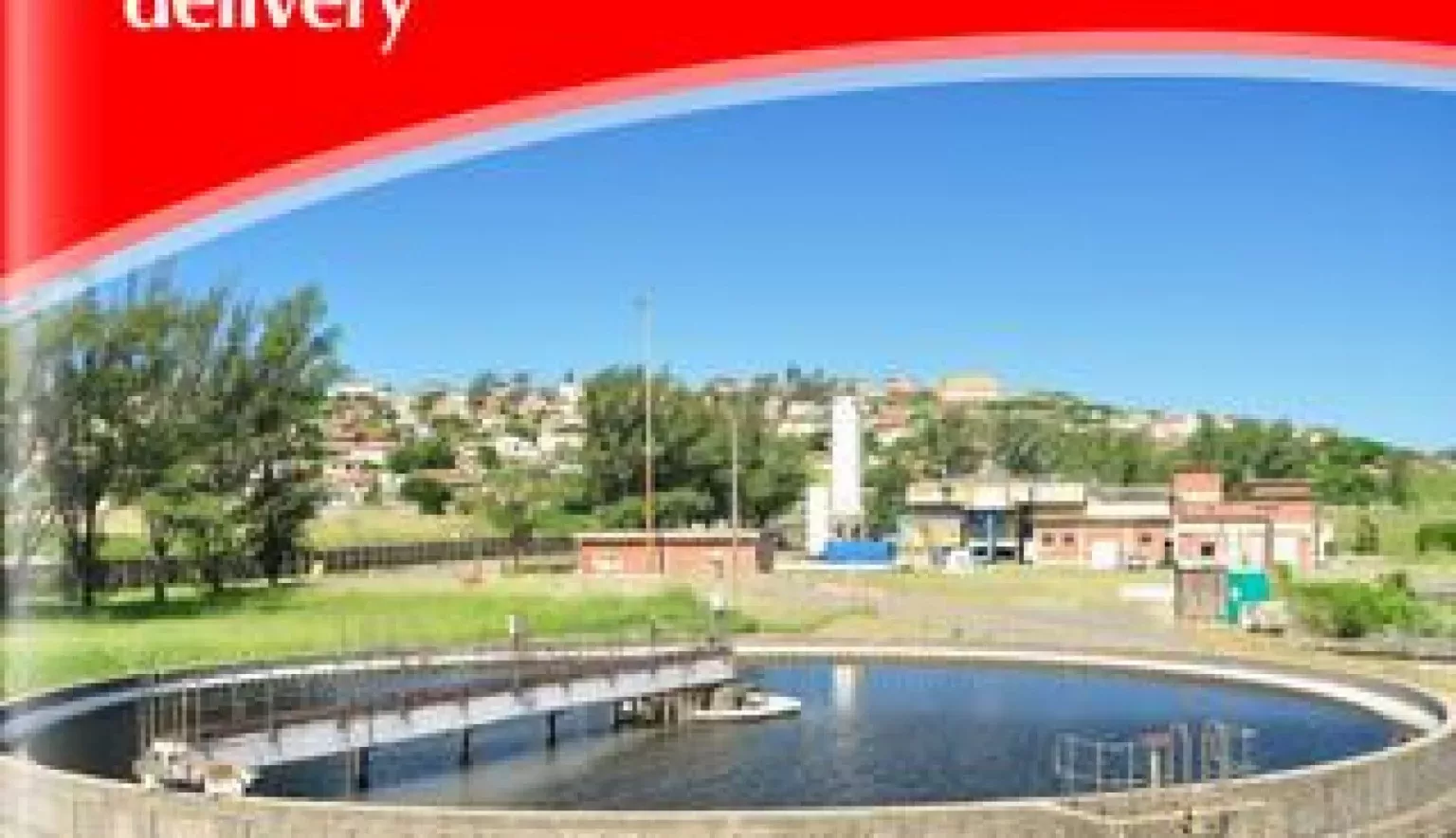Veolia Water Technologies South Africa has more international experience than most in the realm of water optimisation and is leveraging its unrivalled sector knowledge to strive for enhanced wastewater management in the future.
COMPLETE WATER SOLUTIONS FOR AFRICA
With South Africa rapidly running out of conventional water sources, alternative water resources are becoming more critical. There is a strong argument for reusing treated wastewater for potable, agricultural and industrial usage. And for coastal towns and cities, desalination plants are seen as an increasingly attractive solution to meet immediate and drought contingency demand.
A company meeting these requirements on the continent is Veolia Water Technologies South Africa (Veolia South Africa), a water solutions expert providing customised water and wastewater treatment solutions for municipalities and industries alike.
Working across a range of industries including automotive, food & beverage, mining, petrochemicals, pharmaceuticals, power generation, pulp and paper, and steel, the South African arm of the globally renowned operator has full engineering, project management and production capabilities, driven from its head office and production facilities in Johannesburg and its regional offices in Durban and Cape Town.
Complementing international sites in Botswana and Namibia affirm Veolia’s wider Southern African influence and contribute to the overall Group’s five continent and 88 country influence on waste, water and energy domains.
“As part of Veolia Water Technologies, Veolia South Africa draws on vast international expertise to deliver a full scope of water treatment activities, with over 350 proprietary technologies as part of its treatment portfolio,” explains Chris Braybrooke, General Manager – Business Development, Veolia South Africa. “The Company is comprised of four divisions, each addressing various aspects of the market: Design and Build, Engineered Systems, Operations & Maintenance and Services Divisions.”
A MULTI-PRONGED APPROACH
Water security has become one of the most pressing issues for governments worldwide, with arid countries like South Africa rapidly approaching a crisis point. Potable and sanitation requirements are essential, and need to be balanced with the requirements of industry to spur continued economic growth.
“We need a multi-pronged approach to address these issues in parallel and develop the optimum life cycle costing models to meet immediate, medium and longer-term priorities,” says Braybrooke. “There is limited scope for the construction of new dams, and our rivers are already over-stressed and frequently polluted. Overly polluted water sources are much more costly to treat, and it is not economically viable to treat a considerable volume of our water for this reason.
“The natural progression would be a shift to wastewater reuse as one of the practical measures. The treatment of acid mine drainage water in Gauteng, in which Veolia was a key contributor, is a truly innovative example of wastewater management that can reduce freshwater consumption of both consumers and industry.
“Then there’s desalination, which is widely adopted globally and gaining renewed traction in South Africa, where Veolia has commissioned seven plants to date; including the country’s largest, Mossel Bay. This plant supplies 10 megalitres of potable water to the municipality and five megalitres of process water to PetroSA.”
Desalination is traditionally a coastal option, but inland brackish water systems and brine streams can also be treated using Veolia technologies.
The standard desalination methodology in Africa is membrane separation via reverse osmosis, which is usually the least-costly approach and ideal for countries with limited energy resources (the other end of the scale is thermal water desalination, which relies on advanced distillation processes). Consequently, a number of the major South African metros are now looking at mega plants, ranging upwards from 150 megalitres.
Veolia Water Technologies is now believed to be the leader in desalination where, each day, approximately 6.75 million cubic metres is produced via its plants around the world.
“Desalination implementation is a long-term execution process, since the environmental impact assessment process alone is a lengthy one to ensure that sensitive coastal eco-systems are protected,” Braybrooke continues. “Then one has to consider energy supply demands, which tend to be intensive, but do come down on larger plants due to new technologies. Highly skilled specialists are also required to run and maintain these plants. “
PROVEN SOLUTIONS
A world leader across all aforementioned areas, Veolia, a French multinational organisation, has a lineage dating back to 1853, and today its core business segments comprise water, waste and energy, managing services solutions for public utilities and private sector clients of which the industrial segment forms a core component. The Company’s vision and leadership is helping to shape and implement practical models for supply delivery.
Francophone countries in Africa are managed by Veolia’s Marseilles office in France, with the balance of the sub-Saharan continent falling under the Johannesburg regional head office, which has a design and build mandate.
Within Gauteng, the Company has a manufacturing facility in Sebenza and a chemical blending plant in Isando supporting the African region, forming part of the Company’s total solutions offering. Other South African centres are supported by offices in Cape Town and Durban. The total southern African workforce now numbers around 700 personnel.
“Be they conventional or more specialised, we have proven solutions for treating any water source to a potable grade,” says Braybrooke. “It’s important to emphasise that each solution we offer is ‘fit for purpose’.
“Veolia South Africa’s services measure and improve environmental and economic performance and we implement energy-efficient water treatment strategies.”
A RACE AGAINST TIME
The question in South Africa remains: Where is the starting point for water security management?
“The fundamental objective should be to firstly manage available resources in terms of optimum operations, maintenance and supply, where Government has publicly expressed concern for the way this is currently executed and is calling for interventions,” Managing Director for Veolia South Africa, Gunter Rencken, answers. “It starts with addressing water losses in older and failing infrastructure, but for most South African metros it’s a race against time, so in addition to this, other sustainable measures must also be adopted. We need to consider that urbanisation trends reveal a major migration away from rural areas. How are we going to manage this demand?”
A classic example by way of response is the reuse debate. Commissioned in May, 2001, the Durban Recycling Water Works is a Public-Private Partnership (PPP) concession business, purpose-designed by Veolia to re-treat wastewater for industrial use. Since its commissioning, Veolia has been providing operations and maintenance services to the plant for over 13 years. This facility meets dedicated demand for a petrochemical plant and pulp-paper manufacturer, which saves on the overall costs for municipal infrastructure.
Braybrooke explains: “Upgrading this process water to a drinking water standard is such a small step that this would be the logical progression. However, there is public resistance to the thought of wastewater reuse. Our opinion is that Government needs to be more proactive in communicating the safe advantages of reuse.”
TURNING WASTEWATER INTO A RESOURCE
Across the board, Veolia South Africa focuses on offering a design, build, and operate model; skills transfer being a core component. In the larger ambit, Veolia is a leading implementer of the PPP model globally.
Given South African Government buy-in, Veolia believes PPPs have real merit as a mechanism for driving SA Treasury and international funding. However, PPPs remain few and far between at this stage locally and are not the solution or a substitute for ineffective utilities management.
Rencken concludes: “Veolia South Africa brings the key advantage of technical advice and assistance, helping authorities to optimise and use current resources to the maximum. That’s before you start investing in new infrastructure.
“It’s all about long-term planning, at least 30 years ahead, taking a holistic view of supply. So reuse has to be an immediate focus. Let’s start by turning wastewater into a resource.”































